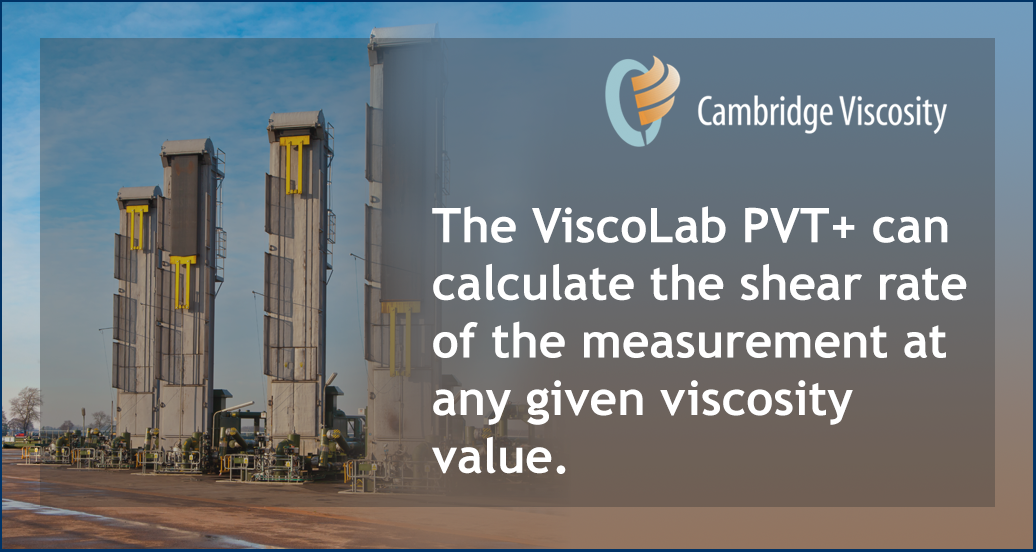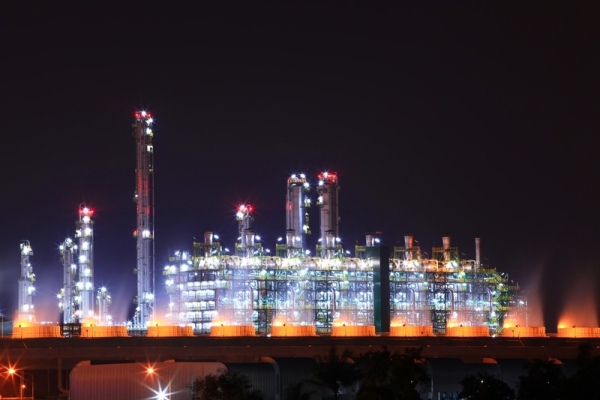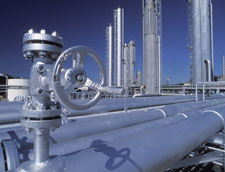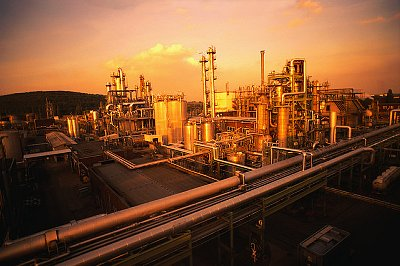Getting rheological data that mimics subsurface conditions above 15,000 PSI and/or 200°C can be a challenge with conventional rheometers. The Cambridge Viscosity ViscoLab PVT+ offers a solution to this challenge by providing shear rates with the viscosity measurement and a shear sweep function to collect data at multiple shear rates within a single test. The PVT+ has options for measuring at pressures in excess of 30,000 PSI (or higher upon request), temperatures to 315°C, and viscosities as low as 0.02cP, which is well beyond the capability of commercially available, HPHT rheometers.
Using the ViscoLab PVT+ to Measure Non-Newtonian Fluids
Nov 3, 2021 10:21:54 AM / by Patrick Riley posted in oil viscosity, viscosity measuring solution, viscosity control, viscosity management, ViscoLab PVT+
Oil Viscosity Index Standardized Using In-line Viscometer
Sep 10, 2020 8:26:16 AM / by Admin posted in process viscometers, oil viscosity, refining
A leading worldwide maker of premium base oil for lubricants, based in the western United States, has standardized on Cambridge Viscosity
Refinery Viscosity Management: Lessons Learned
Sep 19, 2019 8:00:00 AM / by Admin posted in oil viscosity, refining, asphalt viscosity
Viscosity is one of the most important measures of refinery product quality. All refinery products are graded by viscosity.
Significant efforts are spent throughout refinery operations in achieving viscosity targets. Working with customers worldwide, Cambridge Viscosity has identified five factors most important for efficient and effective refinery viscosity management.
Major Refinery Improves Profitability with Viscosity Monitoring
Apr 1, 2019 10:00:00 AM / by Admin posted in process viscometers, 392 sensor, oil viscosity, monitor viscosity, refining, VISCOpro1600, compressor viscosity
Boston—Machinery failures, downtime and maintenance labor costs can kill a refiner’s bottom line profits. A major US oil company with refinery installations in North and South America has installed several Cambridge Viscosity VISCOpro viscometers to monitor oil viscosity, providing engineers with real-time information on oil quality. The viscometers utilize Cambridge’s 392 process sensors and are Class 1 Div 1 Group B, C, and D certified.
Cambridge Flanged Viscometer Registered in ABSA Program
May 9, 2018 12:00:00 PM / by Admin posted in process viscometers, 392 sensor, oil viscosity, refining, marine fuel
Boston—Cambridge Viscosity’s flanged viscometer, or SPL/C 392 sensor, has been accepted for registration in the Alberta Boilers Safety Association (ABSA) Design Registration Program. This designation certifies that the sensor design complies with the Safety Codes Act.
“Being accepted into ABSA’s program certifies that the SPL/C 392 sensor can be used in high pressureenvironments up to 1400 PSI,” says Cambridge Director of Engineering Daniel Airey. “This sensor is particularly effective for marine fuel, oil pipelines and refineries.”
The SPL/C 392 in-line viscometer provides continuous, real-time measurement of temperature and viscosity. The sensor’s patented technology is based upon a simple, reliable electromagnetic concept. Two coils pull a piston back and forth within a constantly refreshed sample of process fluid. Proprietary circuitry analyzes the piston’s travel time to measure absolute viscosity. A built-in resistance temperature detector (RTD) senses the actual temperature in the measurement chamber.
Measurements can be made in any of the 13 different 20:1 viscosity ranges, covering a span of 0.2 to 20,000 cP. The sensor is designed with a four-bolt stainless steel SAE Code 61 flange and is easily installed in pipelines ranging from 2” and larger. The sensor’s self-cleaning feature provides for low-maintenance and ease-of-use across applications.

About Cambridge Viscosity
Cambridge Viscosity is the leading supplier of automated viscometers used by oil exploration and refining, coating, chemical and life science companies to optimize product and process performance. Cambridge Viscosity's sensors and viscometer systems conform to ASTM, DIN, JIS and ISO standards, with a range of models designed to meet specific industry and application needs.
Type certifications include ATEX, CE and FM. CSA certification is available upon request. Cambridge's global reach provides application engineering support and service wherever and whenever needed. To learn more visit www.cambridgeviscosity.com.
NTPC India Uses Small Sample Viscometer to Monitor Lube Oils
Jan 26, 2017 2:28:00 PM / by Admin posted in oil viscosity, lube oil viscosity, small sample viscometer, oil analysis, VISCOlab4000, India, Asia Pacific
NTPC, India’s largest thermal power generation company, has purchased a Cambridge Viscosity small sample viscometer, VISCOlab 4000, monitor lubrication oils. NTPC uses large quantities of a variety of oils—lube, fuel, diesel, transformer and gear oil— to operate machinery in their plant. The company will use the laboratory viscometer to verify the quality of inward petroleum material.










